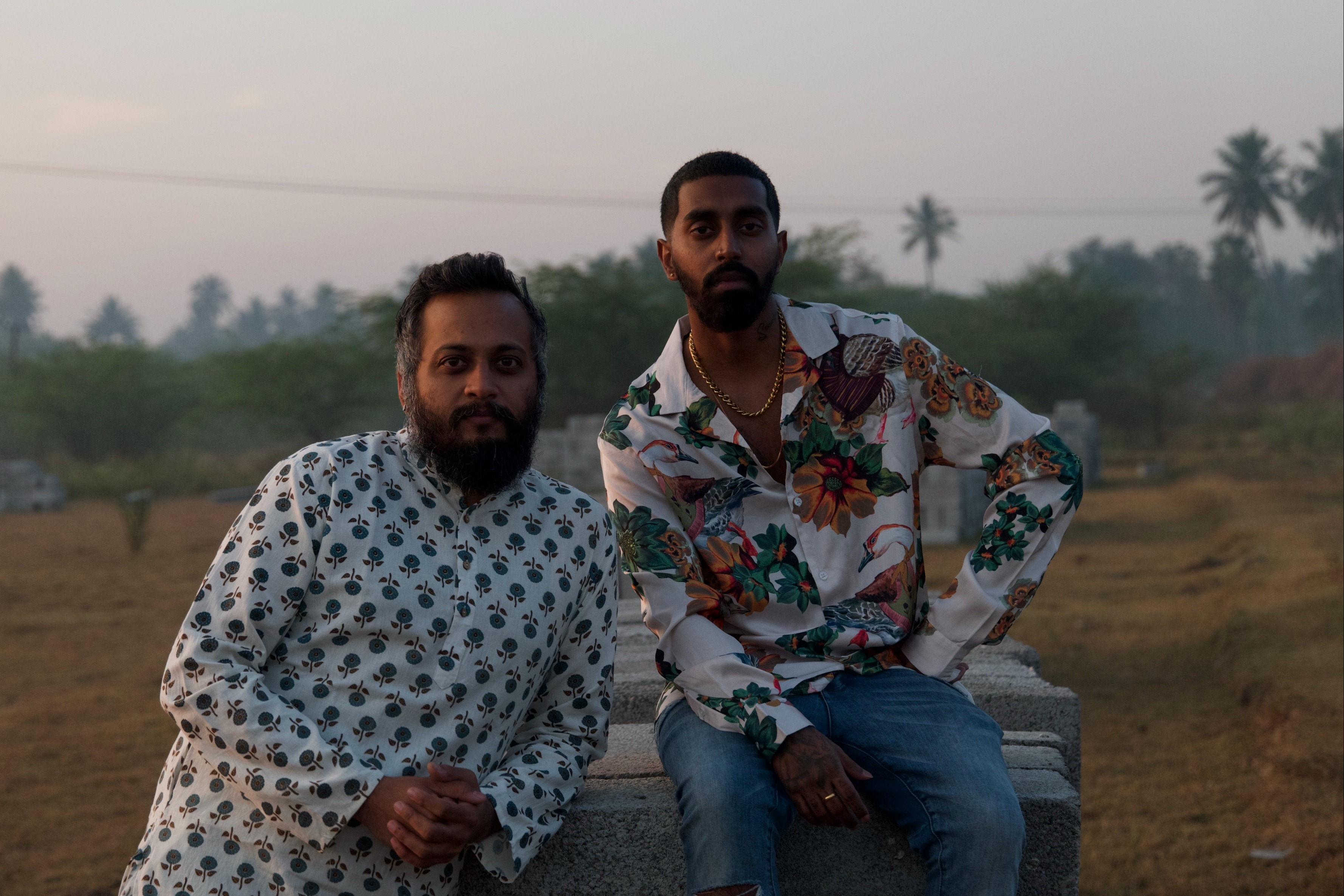
‘Arul’ embodies the essence of unconditional love, formally translated to “grace” or “blessing,” which is embraced in Yanchan and Sandeep Narayan’s album. ‘Arul’ was released on November 9, 2023, and is available to stream on Spotify and Apple Music.
Yanchan and Sandeep have transformed Carnatic music, offering a fresh rendition that incorporates multiple musical genres in an accessible way—creating a new style of music that bridges South Asian Carnatic music with North American mainstream elements.
As a listener, the album offers an elevating experience that resonates deeply with the soul, evoking a range of emotions that instil utter bliss, just as Arul intends. This experience fueled my excitement to interview Yanchan himself, exploring the production process, the significance, and the purpose that 'Arul' serves to its listeners. I highly recommend listening to 'Arul' to allow for this article to resonate with you
Yanchan is a music producer from Scarborough, Ontario, Canada. He has achieved numerous milestones as a musician, producing two albums, 'The Scarborough Beat Tape' and 'The Vancouver Best Tape,' touring with Santhosh Narayanan on his 'Sounds of the South' tour, performing alongside Shan Vincent De Paul, and gaining recognition for seamlessly fusing Mrithangam with Rap music.
Sandeep Narayan is a renowned Carnatic vocalist celebrated for his exceptional performances on the classical music stage. Born and raised in Los Angeles, California, Sandeep broke boundaries by becoming the first US-born musician to move to India for a full-time music career, inspiring many musicians today. He has received numerous titles and recognitions, including the prestigious 'Ustad Bismillah Khan Yuva Puraskar' from the Sangeet Natak Akademi, the national-level academy for performing arts established by the Government of India.
Yanchan was 13-years-old when his fate intertwined with Sandeep. At this age, he convinced his parents to let him live in Chennai, India for three months, where he met Sandeep. Their paths crossed when Yanchan’s parents decided to document his experience in India by shooting a concert DVD, and as a result, they hired Sandeep as the vocalist for the project.
After returning to Scarborough from India, Yanchan resumed high school at Woburn Collegiate Institute. During this time, amid the rising popularity of hip-hop, notably Drake, he developed an appreciation for the genre. Yanchan notes, “The rhythms, drums, and sampling resonated with how I played certain patterns.”
Yanchan's growing interest in both South Asian music and hip-hop sparked his curiosity to explore blending these two musical genres. This curiosity led him to delve into music production in 2015.
What is my Identity? It's a question that we all seek to answer in our own ways throughout our lives. Each episode of Identity spotlights a different creative, some from the Tamil community and some from outside it, who will be chatting about how we take ownership of our narratives, art, politics and of course who we are. We hope to inspire you through their unique stories of seeking and finding Identity. Catch Season 1 below!
- Shakthi / Theatre, Intergenerational Trauma and Australian Tamil Identity
- Identity Podcast: Anuk/ Language, Grief and Tamil Community
- Maral/ Art, Belonging & Armenian-Iraqi-Canadian Identity
- Shuba/ Music, Feminism and Dual Identities
While Sandeep and Yanchan pursued their individual musical endeavours, they maintained a connection throughout the years since they first met. During the pandemic, Sandeep contacted Yanchan after observing his Mrithangam Rap Episodes on Instagram and TikTok. Sandeep proposed a collaboration to blend Carnatic music with hip-hop and other genres. Yanchan expressed immediate delight, saying:
“I looked up at the sky and thought, 'Okay, thank you.' He is the ideal person for a project like this.” Yanchan explained, “Sandeep isn't just a typical Carnatic singer who grew up in Chennai and underwent the traditional process. He was raised in LA and has a background in North American culture, exposed to similar styles of other genres, just like I was. So, he would be the perfect candidate for an experimental album like this.”
I asked Yanchan to guide me through the album production process.
Yanchan explained, “Many of the songs on this album are ones I grew up falling asleep to or loving. I wanted to bring back the same feelings. I sent him the first beat for 'Tradition,' the album's intro, and he sent me back what you hear on the record. It was almost like a one or two-take process. The album was a natural and organic process.”
The album's production commenced at the start of the pandemic in 2020, taking three years to complete and release. After finalizing the album a few months ago, Yanchan's team focused on structuring and strategizing its branding and marketing.
Yanchan elaborates that his team organized a non-traditional listening party, marketing it as an 'experience event.' They sold out the venue to over 200 people to a downtown club and set up five interactive exhibits to depict the number of songs on the album, representing the five senses.
The exhibits showcased what 'Arul' looks, sounds, tastes, feels, and smells like. A virtual reality station allowed users to experience Chennai, India. A listening station enabled participants to preview all the songs on the album, allowing them to choose their favourite, which was then performed at the end of the night. A mixologist created five South Asian-themed mocktails, each representing a song from the album. A touch exhibit displayed all the instruments used to make the album, allowing users to interact with each. Finally, incense sticks were lit around the venue, exhibiting the smell of ‘Arul,’ with an expert explaining the significance of the fragrance. This immersive experience ignited all the senses, offering an experience beyond a traditional listening party for the 'Arul' album.
Reflecting on the listening party, Yanchan shares, "We had a diverse crowd—white people, black people, Asian people—representing all walks of life. It was a new experience for them, and they were intrigued by the music. The fact that everyone enjoyed it made me realize that the bridge I'd envisioned my whole life was forming. I always talk about creating a bridge between South India and North America, and I saw it happening. It was a beautiful thing to witness.
‘Arul,’ translated as unconditional love in Tamil, prompted me to ask Yanchan why he chose this title and what it means to him.
Yanchan shared that he experienced abundant love throughout his upbringing, from his family to his profound connection with music. Reflecting on a recent trip to Malaysia for the Shan Vincent De Paul show, he recounted a conversation at a small party in Sandeep’s hotel room. Discussing the various aspects of marriage, introducing the concept of 'arul' as a stage where love transforms into an unconditional and selfless connection, achieved through the comfort and familiarity between two partners.
Through this reflection, Yanchan realizes that this album might not have come to fruition if he and Sandeep didn't possess the unconditional love they share for creating music and blending it with hip-hop and R&B. Yanchan emphasized, “Music is at the core of our identities — his, mine, and ours collectively. This shared, unconditional love allowed us to bridge the gap between genres. And that's how the name came to be.”
I Commented on the album's embodiment of nature, featuring raw and authentic elements with deeply rooted vibrations, I asked Yanchan to share his inspiration behind the album's theme and meaning.
Yanchan explains that every song felt like a distinct moment, “a snapshot of life.” He wanted to convey that concept visually, which led to the idea of finding five locations in or around Chennai. For instance, when they shot ‘Angel,’ they sat on a wall while the sun rose in the background, capturing a unique visual reflecting the album's vibrant energy.
Yanchan says, “‘Arul' felt personal, graceful (as 'Arul' means grace), raw, and uncut. In the video for 'Everglow, “we visited an actual saree-making place. One scene shows me sitting on the ground while a craftsman manually makes saree threads—a beautiful moment in real-time. Similarly, in a recently released video, we went to a brick-making factory, capturing the live and raw process of people engaged in what they love, pushing their culture and interests.”
For my final question to Yanchan, I asked, what do you hope listeners will take from your album?
To which Yanchan replied, “I just hope that, especially for people who aren't familiar with Carnatic music or South Indian classical music, when they hear this, they'll think, 'Damn, I've never heard something like this before, but it sounds so fresh, new, and beautiful.' I want them to be excited about listening to it at clubs, on road trips with friends, or at festivals. Making the music accessible has always been the goal, and it's been the goal of this project from day one. How do we take Carnatic music without taking away from its traditional essence and place it in a new space where people can digest it? I believe we're doing exactly that.”
Yanchan emphasizes that we are in a current movement where the Tamil language and other people’s music can reach a broader audience - finding beauty in how music resonates with people without the need to comprehend language. Instead, they are comforted by the vibrations that engage the five senses, just as ‘Arul’ does.



























